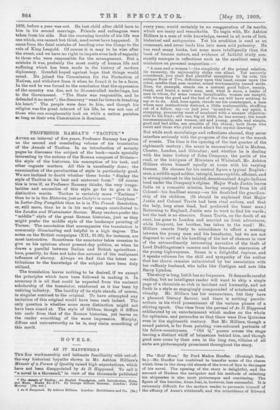PROFESSOR RAMSAY'S " TACITUS."* AFTER an interval of five years,
Professor Ramsay has given us the second and concluding volume of his translation of the Annals of Tacitus. In an introduction of seventy pages he discusses the subject of the book—made specially interesting by the notices of the Roman conquest of Britain— the style of the historian, his conception of his task, and other cognate matters. All this is excellently done; the examination of the peculiarities of style is particularly good. We are inclined to doubt whether these books " display the style of Tacitus in its best and maturest form." Of course this is true if, as Professor Ramsay thinks, the very irregu- larities and anomalies of this style go far to give it its distinctive merits. Tacitus is certainly more " Tacitettn" than he is in the Histories, just as Carlyle is more " Carlylean " in Latter-Day Pamphlets than he is in The French Revolution, or, still more, than he is in his early essays contributed to the London and Westminster Review. Many readers prefer the " middle" style of the great Roman historian, just as they might prefer the middle style of the landscape painting of Turner. The annotation that accompanies the translation is commonly illuminating and helpful in a high degree. The notes on the British campaigns (XII., 31-36), for instance, are most instructive. Sometimes the annotator takes occasion to give us his opinions about present-day politics, as when he draws a parallel between Italian and British agriculture ; here, possibly, he does not take due account of the malignant influence of slavery. Always we find that the latest con- tributions to the knowledge of the subject have been duly utilised.
The translation leaves nothing to be desired, if we except the principles which have been followed in making it. In accuracy it is all that could be expected from the eminent scholarship of the translator, reinforced as it has been by untiring industry. The lucidity of its style stands, of course, in singular contrast to the original. To have attempted any imitation of this original would have been rash indeed. The only question is whether some more distinction might not have been aimed at. The style of Gibbon, though it differs toto caelo from that of the Roman historian, yet leaves on the reader something of the same impression. Murphy, diffuse and untrustworthy as he is, may claim something of this merit.






































 Previous page
Previous page